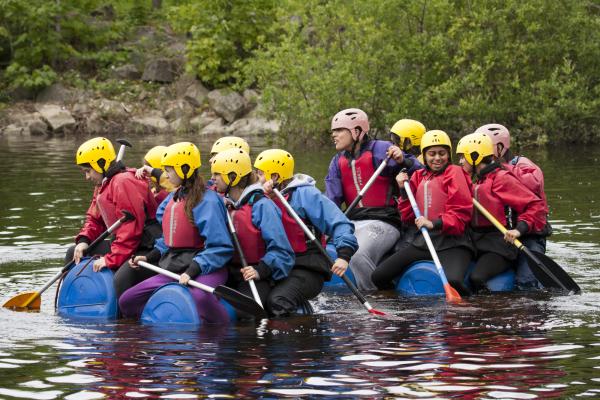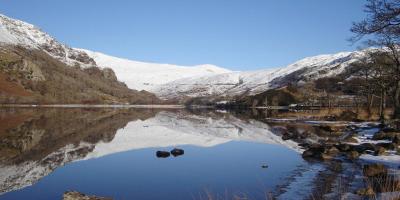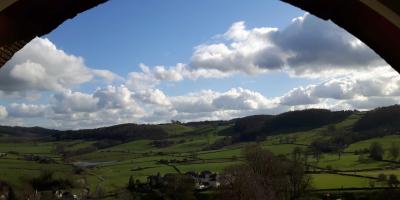At YHA, we believe that every child should have the opportunity to experience adventure and the great outdoors. However, we know that cost can often be the biggest barrier for schools when planning a residential trip. What if we told you that you could enjoy all the benefits of a school residential at a fraction of the cost, simply by choosing to travel in winter? Not only can it significantly reduce costs, but it also offers a whole range of additional benefits for students and teachers alike.
Here are 10 great reasons why your school should consider booking a residential between November and February with YHA.
1. Lower cost
Booking a residential in the off-season is one of the easiest ways to make it more affordable. At YHA, we’re committed to making outdoor education accessible to all, which is why we offer 25% off midweek stays (Sunday to Thursday) for self-led groups of more than 15 people in winter 2024/25 and 2025/26. With lower accommodation and activity costs, you can make the most of your budget and potentially offer the experience to more students.
2. Bursaries available
During the winter months, between November and March, if you meet the criteria, which is that over 30% of your students are on Pupil Premium or receiving free school meals, you can also apply a YHA bursary on top of our winter offer. We believe every child should have the same chance to discover, explore and grow.
3. Strength friendships and build confidence
A winter residential is an excellent way to bring students together and strengthen bonds. When young people are taken out of their normal environment, they learn to collaborate, problem-solve and support each other. These experiences build confidence, resilience and social skills that will hopefully benefit them throughout their school journey and beyond.
4. A positive start to the school year
Starting the academic year on a high can set the tone for success. A residential in the winter term provides a chance to build strong relationships between students and teachers early on, foster a sense of teamwork and stimulate enthusiasm for learning. It’s a great way to encourage positive attitudes and set up a strong mindset that will carry through the rest of the year.
5. Encouraging outdoor activity all year round
Why limit outdoor adventure to just the warmer months? A winter residential gives young people the opportunity to see how the outdoors can be explored all year round. Exploring nature in different weather conditions encourages adaptability and an appreciation for the changing seasons. Plus, outdoor activity plays a vital role in physical and mental health.
6. A calmer environment for SEND students
Off-peak seasons can often mean fewer crowds, which can be particularly beneficial for students with special education needs and disabilities (SEND). A quieter, more controlled environment can help reduce anxiety and sensory overload for children with additional needs, making the trip more enjoyable and accessible for all. With smaller group sizes and a more relaxed atmosphere, SEND students can take part in activities at their own pace and feel more comfortable in their surroundings.
7. Fire up imaginations with unique evening activities
Shorter days don’t mean less fun – they just open up new opportunities! A winter residential is the perfect setting for torchlit walks, storytelling around a campfire, stargazing and evening team challenges. These activities create magical memories that wouldn’t be possible during long summer evenings.
8. Build resilience and improve mental health
Make the most of the winter season with a residential that can do a world of good for children’s mental health. It can provide a valuable opportunity to counteract the effects of reduced daylight by spending time in nature, engaging in uplifting activities, and fostering a sense of connection and wellbeing.
In fact, half of all mental health conditions start by the age of 14, and exposure to fresh air, physical activity and natural light can help alleviate symptoms of conditions such as Seasonal Affective Disorder (SAD). Encouraging students to embrace the outdoors all year round could have long-term benefits for their mental health.
9. Enhance the curriculum in a special way
Winter residentials offer students a fresh perspective on their studies. From geography and biology to history, PE or PSHE, a winter trip provides hands-on learning opportunities that can’t be replicated in the classroom.
It can also be a fantastic cross-curricular experience, encouraging students to connect different subjects in a meaningful way. For example, why not tie in a creative writing project inspired by the landscape or a science investigation into winter wildlife adaptations?
10. Build on learning throughout the year
The impact of a residential shouldn’t end when the trip does! A winter adventure provides a fantastic opportunity for students to carry their new skills and experiences back into the classroom. Whether it’s teamwork, problem-solving or confidence, these lessons can have a lasting effect on learning and personal growth throughout the school year.
With over 60 Learning Outside the Classroom (LOtC) accredited sites, YHA is dedicated to delivering high-quality and safe outdoor education all year round. Take advantage of our winter offer with 25% off residential trips between November and February at any of our LOtC-accredited sites.
Find out more about YHA’s winter residentials.
Discover more about YHA.





